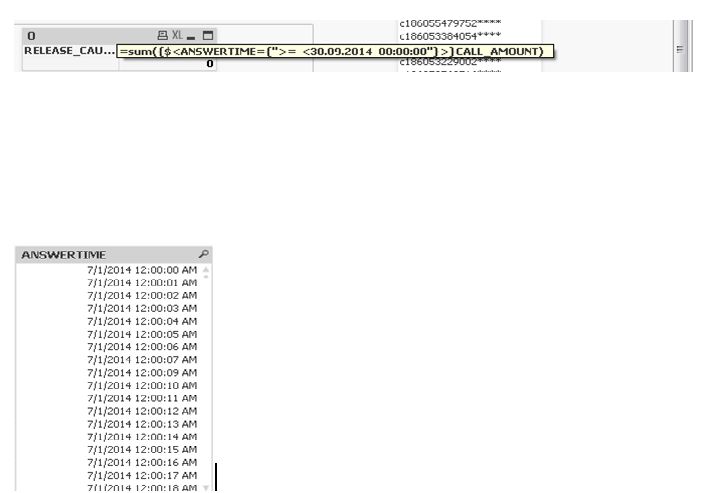Unlock a world of possibilities! Login now and discover the exclusive benefits awaiting you.
- Qlik Community
- :
- All Forums
- :
- QlikView App Dev
- :
- Re: script
- Subscribe to RSS Feed
- Mark Topic as New
- Mark Topic as Read
- Float this Topic for Current User
- Bookmark
- Subscribe
- Mute
- Printer Friendly Page
- Mark as New
- Bookmark
- Subscribe
- Mute
- Subscribe to RSS Feed
- Permalink
- Report Inappropriate Content
script
Hello,
I wrote a set analysis statement caluclates between max(answertime) -1 and max(answertime)
but ıi does not bring any values.
I am probably making mistake .
Could you help me
=sum({$<ANSWERTIME={">=$(date(max(ANSWERTIME)-1,'DD.MM.YYYY 00:00:00')) <$(=date(max(ANSWERTIME),'DD.MM.YYYY 00:00:00'))"}>}CALL_AMOUNT)
- Tags:
- qlikview_scripting
- « Previous Replies
-
- 1
- 2
- Next Replies »
- Mark as New
- Bookmark
- Subscribe
- Mute
- Subscribe to RSS Feed
- Permalink
- Report Inappropriate Content
Try this
=sum({<ANSWERTIME={">=$(Timestamp(max(ANSWERTIME)-1,'DD.MM.YYYY hh:mm:ss')) <$(=Timestamp(max(ANSWERTIME),'DD.MM.YYYY hh:mm:ss'))"}>}CALL_AMOUNT)
or
this
=sum({<ANSWERTIME={">=$(Date(max(ANSWERTIME)-1,'DD.MM.YYYY ff:ff:ff')) <$(=Timestamp(max(ANSWERTIME),'DD.MM.YYYY ff:ff:ff'))"}>}CALL_AMOUNT)
- Mark as New
- Bookmark
- Subscribe
- Mute
- Subscribe to RSS Feed
- Permalink
- Report Inappropriate Content
I added two print screen
- Mark as New
- Bookmark
- Subscribe
- Mute
- Subscribe to RSS Feed
- Permalink
- Report Inappropriate Content

- Mark as New
- Bookmark
- Subscribe
- Mute
- Subscribe to RSS Feed
- Permalink
- Report Inappropriate Content
Your first part is missing and you have different date format.
Try like below
=sum({<ANSWERTIME={">=$(Timestamp(max(ANSWERTIME)-1,'DD/MM/YYYY hh:mm:ss')) <$(=Timestamp(max(ANSWERTIME),'DD/MM/YYYY hh:mm:ss'))"}>}CALL_AMOUNT)
Regards
ASHFAQ
- Mark as New
- Bookmark
- Subscribe
- Mute
- Subscribe to RSS Feed
- Permalink
- Report Inappropriate Content
Your ANSWERTIME format doesn't match format of date(max(ANSWERTIME)-1,'DD.MM.YYYY 00:00:00'))
Change format of date command to match with ANSWERTIME format
=sum({<ANSWERTIME={">=$(Timestamp(max(ANSWERTIME)-1,'DD/MM/YYYY hh:mm:ss TT')) <$(=Timestamp(max(ANSWERTIME),'DD/MM/YYYY hh:mm:ss TT'))"}>}CALL_AMOUNT)
- Mark as New
- Bookmark
- Subscribe
- Mute
- Subscribe to RSS Feed
- Permalink
- Report Inappropriate Content
It didnt work again
- Mark as New
- Bookmark
- Subscribe
- Mute
- Subscribe to RSS Feed
- Permalink
- Report Inappropriate Content
Is ANSWERTIME in DD/MM or MM/DD? Accordingly fix format in Timestamp. Did you use TT in Timestamp format?
- Mark as New
- Bookmark
- Subscribe
- Mute
- Subscribe to RSS Feed
- Permalink
- Report Inappropriate Content
format is MM/DD I changed with this format it still does not work
- « Previous Replies
-
- 1
- 2
- Next Replies »